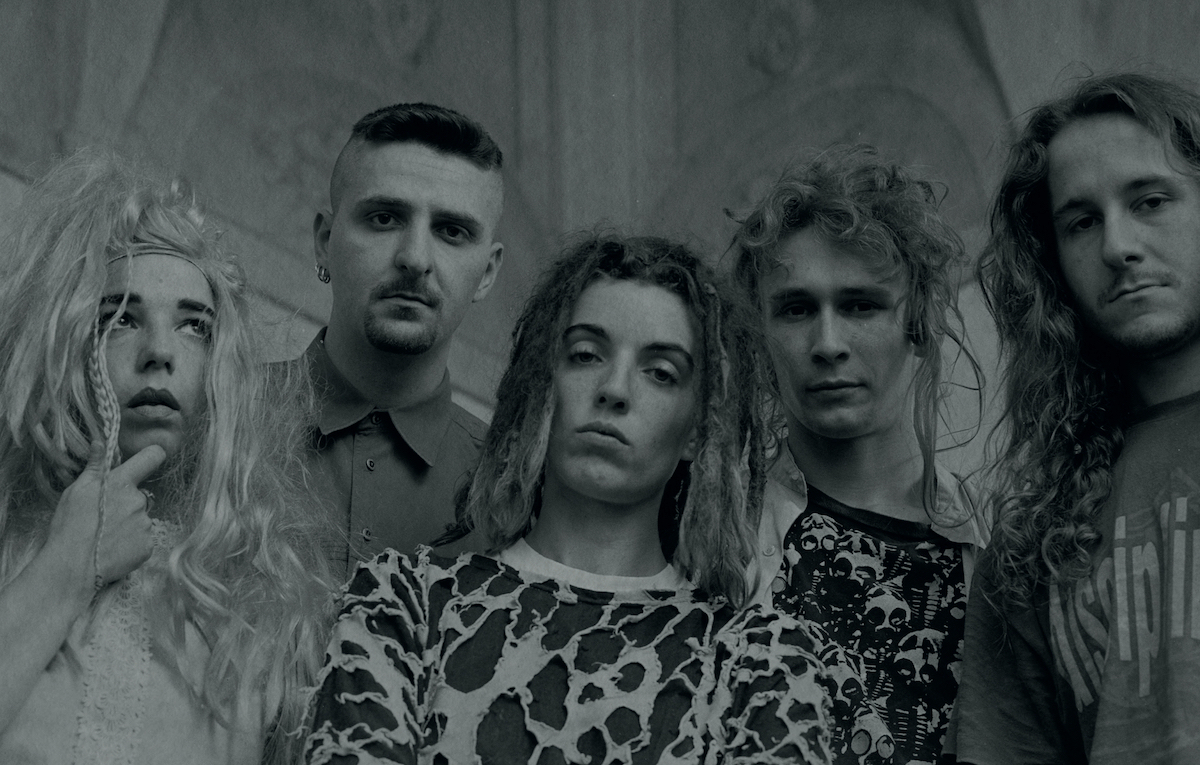
Disciplinatha mk II: L-R Valeria Cevolani, Cristiano Santini, Roberta Vicinelli, Dario Parisini, Daniele Albertazzi.
The year is 1994. On Italian television, a man wearing sunglasses indoors raps, horribly, while his bandmates awkwardly swivel and gyrate to a pedestrian funk-metal backing that comes off a lot more Extreme than Machine. This is what Disciplinatha, Bologna's spiciest cultural export, have been reduced to, and things would only get worse as the decade progressed.
While the latter half of Disciplinatha's career certainly has its moments (the above performance not included), the 1990s saw the band spiral into a creative decline that occasionally brushed against something approaching mainstream acceptance - the last thing Disciplinatha or indeed the mainstream Italian listener ever wanted.
But we're getting ahead of ourselves. To understand what in God's name happened to this band, we need to talk about a country that still more or less exists. Let's talk about Italy (c. 1994 - present).
The Second Republic
"The old world is dying, and the new world struggles to be born: now is the time of monsters." - Antonio Gramsci
By the start of the 90s, the world into which Disciplinatha had emerged kicking, screaming and saluting only a few years earlier had changed beyond recognition.
The Soviet Union was on its way out, taking many a Western communist party with it, the PCI included. The Christian Democrats, having ruled Italy continuously since the end of the Second World War, were collapsing under the weight of their own corruption. The "mani pulite" ("clean hands") inquest revealed a political system so riddled with sleaze and outright criminality it became known as Tangentopoli ("Bribesville").
In what was possibly the only morally correct action the grotesque hunchbacked cacodemon would take in his entire life, prime minister Giulio Andreotti publicly acknowledged the existence of Operation Gladio in 1990 - finally vindicating anyone who thought it a little suspect that, during the Years of Lead, far-right terrorist groups always seemed to have easier access to weapons than the far left.
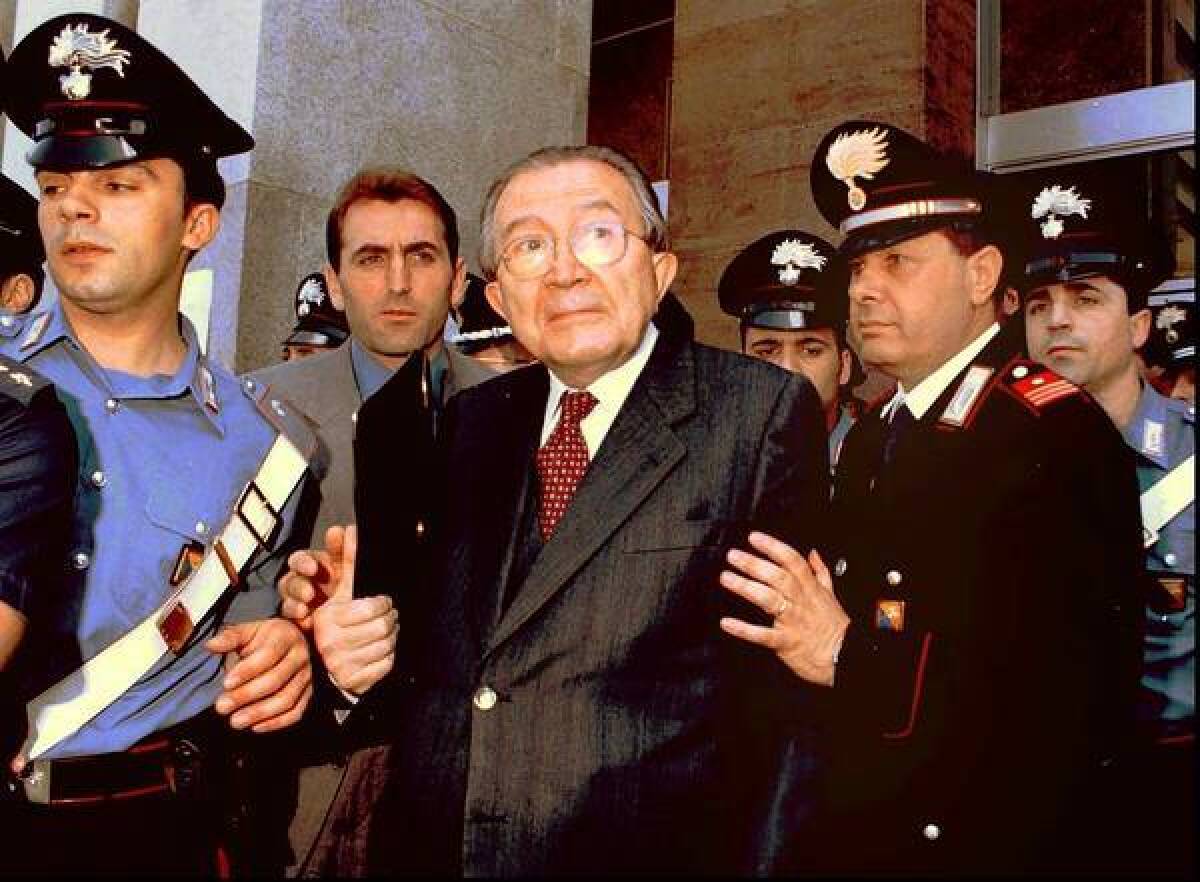
After a long day in court, Beelzebub is escorted back to the sewers of hell whence he slithered.
The old world was dying, and the new one was just getting lubed up for action. As the judiciary set about draining the festering swamp of kickbacks and suspicious deaths that the Christian Democrats left behind, Italy was soon to undergo a change of management with the election of one Silvio Berlusconi.
Berlusconi, of course, was an outsider only in the sense of having had no previous involvement in electoral politics. He was connected to so much of the same filth as the Christian Democrats - including the mafia and the Propaganda 2 Masonic lodge - as to make the Milanese tycoon a member of the First Republic's deep state by mere association.
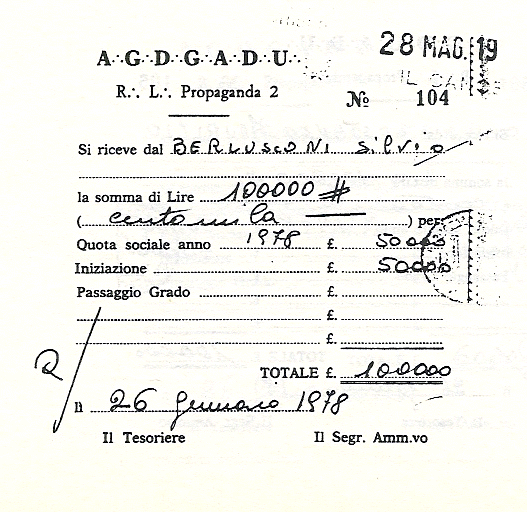
A receipt for Berlusconi's Propaganda Due membership dues, 1978.
March on Rome
1991. Following a failed coup attempt against Gorbachev - one last ditch attempt to save communism - the USSR officially dissolves. After a brief spell in Serie A, Bologna face relegation. Disciplinatha get signed to CCCP's label, I Dischi Del Mulo ("The Mule's Records") and in doing so, become accepted by the Italian alternative scene. After all, if the likes of Ferretti and Zamboni are cool with them, Disciplinatha cannot possibly be fascists.
For a short while, it seemed as if things were looking up for Disciplinatha, even after the departure of a founding member. Fortunately, Roberta Vicinelli stepped in to replace original bassist Marco Maiani, who had quit the band after tiring of the isolation they had created around themselves ("It's boring only playing live two or three times a year for fear of getting beaten up"). But having been welcomed into the fold of "acceptable" Italian counterculture, Disciplinatha's long march through the institutions was only just beginning.
New World Order
"We were becoming more of a band, and less of a propaganda collective." - Santini
Three years after Dischi Del Mulo unleashed Crisi Di Valori, a double-barelled blast of pure snarling rage that was effectively a swansong for the old, rabidly angry Disciplinatha, the label rebranded as Consorzio Produttori Indipendenti ("Independent Producers Consortium") and brought out Un Mondo Nuovo, a hit-and-miss effort that nevertheless opened up A New World of mainstream acceptance and popularity for the band.
Opening with Cevolani's sinister rendering of an old nursery rhyme over some ominous bass chords, "East & Side" promises a colder, more technological and yet more melodic side to Disciplinatha. "Sbagliato" is an immediate step back, however, sounding like it's made of rejected Therapy? quasi-metal riffs. And, not naming any names, but it's not even the worst track on the album.
It's not all unlistenable dreck, however. Putting aside Santini's rapping - which is wretched even by white Italian standards - the title track has a soaring, melodic chorus that the younger, angrier Disciplinatha could never have come up with. At first listen it sounds like a rallying cry for the new, clean, corruption-free Italy, but the lyrics drip with bitter skepticism at the idea that this new Italy could spring from the loins of the same godfathers that governed the old one.
"United, attentive and vigilant, democratic brothers / We will make a new world, united for the new / Irreproachable judges, free carabinieri / Innocent politicians, entrepreneurs and technicians / Benevolent, honest, unyielding bureaucrats / They will make a new world, for us the new world order"
Battle Hymns of the Republic
Besides the title track, two most triumphant moments on Un Mondo Nuovo are both cover versions, one of a pop song and one of a popular song.
"You build barricades in the square / for the bourgeoisie / that creates false myths of progress" - Franco Battiato, "Up Patriots To Arms"
With its title taken from some graffiti he once saw in London, Franco Battiato's sublimely cynical rant against the post-war apathy and spent revolutionary spirits of western Europeans took on additional layers of meaning when given the Disciplinatha treatment 14 years and a collapsed Berlin Wall later. We can only speculate at what the graffiti meant, but the title here could refer to the patriots of the French Revolution who overthew the monarchy (something which Italy did in 1946 via the ballot box rather than the guillotine).
"Up patriots to arms", "Engagez-vous!", "Alla riscossa, stupidi!" ("Rise up, idiots!") - the point is made in three languages, the sarcasm biting harder each time. Perhaps Battiato was taking aim at the youth of the time, young punks around Disciplinatha's age with plenty of piss and vinegar but no cause to rally around. In Disciplinatha's hands the sarcasm is turned back towards Battiato's generation, the self-satisfied children of the fascists and anti-fascists who fought each other in World War Two so that future generations wouldn't have to.
Even more poignant is Disciplinatha's take on Vi Ricordate Quel 18 Aprile ("Do You Remember That 18th April"), by folk singer and former rice paddy worker Giovanna Daffini. The 18th April in question: 1948, an election year in which, you may remember from parts one and two, the Christian Democrats surfed a wave of anti-communist hysteria to begin their 46-year reign of terror and corruption.

Giovanna Daffini: this mondina kills fascists.
The song also mentions Mario Scelba, the diabolical Interior Minister who, ahead of that fateful election day in April 1948, threatened to deploy riot police against communist "troublemakers". Scelba was the same piece of work who purged former patisans from the police force and played an active part in orchestrating Operation Gladio - with "democrats" like these, who needs fascism?
"Do you remember that 18th of April / when you voted for the Christian Democrats / Without thinking about tomorrow / you ruined it for the youth" - Giovanna Daffini, "Vi Ricordate Quel 18 Aprile"
The above clip was taken from the 1995 documentary Materiale Resistente (Resistant Material) which features interviews with former partisans and clips of contemporary bands performing old Italian resistance songs such as Bella Ciao. Disciplinatha's own contribution would be the same version of "Vi Ricordate..." that appears on Un Mondo Nuovo.
This cover could be the linchpin to understanding Disciplinatha. Not only is it one of their most popular songs, and probably the last decent track they ever recorded, it's one of their most perfectly executed satirical attacks.
"But the communists are unafraid / they will defend freedom"
We're all familiar with the classic Laibach stunt where you riff on an English language rock or pop hit to tease out the underlying fascism. One world, one nation, ein Reich, ein Laibach, give me ein light beer, etcetera. Well, here's a merry bunch of crypto-fascists doing the reverse, jeering at the communists for still holding their heads high after a crushing defeat. Right?
I thought so originally, but after repeated listens I'm not so sure. Hauntingly, although Valeria Cevolani sings the chorus, Daffini's voice is sampled throughout the verses. As tempting as it is to be cynical about Disciplinatha's motivations, there is something affectingly genuine and sincere about their honouring of the original artist in this way.
It's even harder to deny the sincerity of this 2012 live performance in which a mondine choir joins the band on stage, similar to Test Dept standing Shoulder to Shoulder with the striking Welsh miners' choir.
By covering an anti-fascist song with apparent sincerity, Disciplinatha finally came full circle (or a nice exact semi-circle, depending on how you look at it), returning to the sinister political ambiguity of their early work from the opposite direction. There was nowhere left for them to push the concept further. Regrettably, that didn't stop them releasing a third - dreadful - album.
"We wound up in a system that was everything we were against. [...] You end up playing in a place full of flags, being used by someone politically...and this is violence. At some point [Disciplinatha] stopped producing violence, and found ourselves on the receiving end of it instead." - Parisini
The end of history
By 1996, Disciplinatha were unsalvageable. The sparse moments of brilliance that made Un Mondo Nuovo well worth listening to despite its noticeable dip in energy are nowhere to be found on Primigenia, an album the band described as a return to their pre-Disciplinatha roots - rock, new wave and goth.
In other words, it's an exercise in nostalgic masturbation that harks back to a time before the collective discovered shock tactics and playing with an intensity that suggested genuine malice towards the audience, the two elements that set them apart from any of the college rock pappemolli hanging off CCCP's Red Army greatcoat tails.
An uncharacteristically shy, defeated-looking Valeria Cevolani leading the band, shortly after timidly correcting a vapid TV presenter who introduced her as "Maria".
n0teeth is not exaggerating when we tell you that Primigenia is so mediocre it made us angry to have to listen to it. If this painfully inoffensive, acoustic-tinged alt-rock slop was Disciplinatha's way of apologising for all the bad taste, the riots, the trashed venues and burned bridges, then quite frankly they'd have made better amends by simply packing it in after Un Mondo Nuovo altogether.
There are parallels between Disciplinatha's decline and that of their old muse/nemesis, the Italian Communist Party. Just as the so-called end of history diluted the band's sound, image and purpose, so too did it destroy the PCI, which was at first succeeded by the democratic socialist Democratic Party of the Left, then by the centre-left Democrats of the Left, before that in turn was finally swallowed whole by the third way Democratic Party. Pasokified to death, in other words.
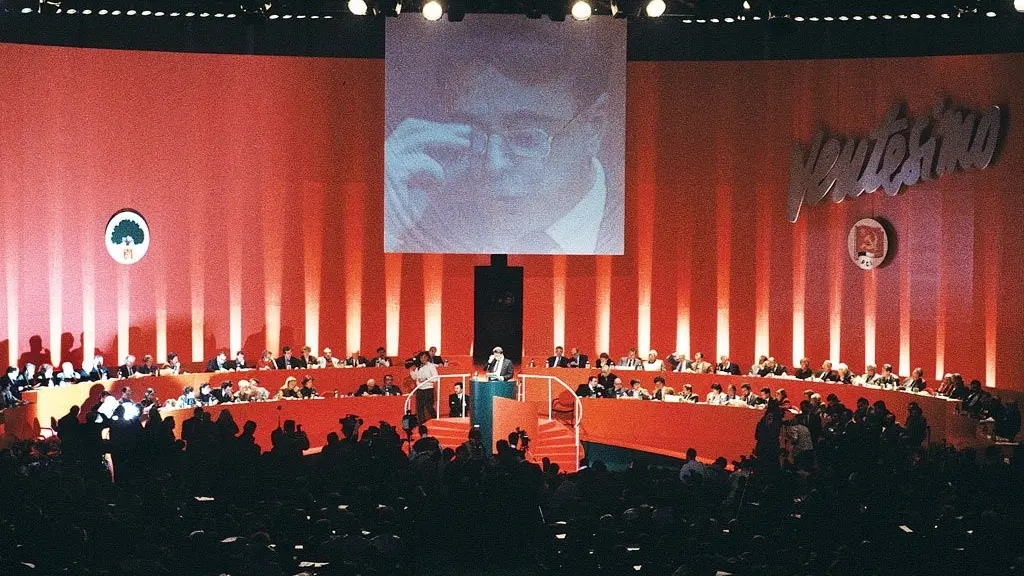
The PCI's 20th and final congress, Rimini, February 1991. Note the PDS logo already being displayed on the left. Source: Collettiva.
With Berlusconi promising a Ferrari in every garage and a ragù in every pot, there was little public appetite for extreme responses, either politically or musically. By the turn of the millennium, Disciplinatha were plumbing depths of irrelevance previously explored only by the Sex Pistols. You either die a Sid Vicious or you live long enough to see yourself become a John Lydon.

Actual still from Santini's brief stint advertising Antica Cremeria.
Rinascimento
Parisini, Cevolani and Santini reunite for Moonlight Festival 2012
It's unclear whether Disciplinatha ever officially broke up or simply went on hiatus, but by the time they "reformed" for a one-off live performance at the Moonlight Festival in their hometown, the world had changed again, while its governing systems stubbornly remained the same. Despite the imbecile Fukuyama's increasingly feeble protestations, history kept happening.
In 2008 Berlusconi had consolidated his political power by forming a coalition with actual, literal, inarguable fascists. Five years earlier, Yugoslavia, Italy's enemy in two World wars and a Cold one, had ceased to exist entirely. And no Italian will ever forget that dark day in 2001 when, in the shadow of the World Trade Centre, anti-globalisation protestor Carlo Giuliani was shot dead by Carabinieri at only 23 years of age.

A washed-up wannabe rockstar and authoritarian warmonger meets Bono and Putin at the 27th G8 Summit, Genoa, July 2001.
In the intervening years, the members of Disciplinatha had all kept themselves busy - Santini founding the label Black Fading Records, Parisini exploring spoken word and languid, jazz-influenced trip hop sounds with El Muniria. And unless the name and striking resemblance are an incredibly unlikely coincidence, then former drummer Daniele Albertazzi is now professor of politics at the University of Surrey. His specialist subject? Why, right wing populism of course!
Risorgimento

Somewhere in the last decade, history happened yet again, with Santini, Parisini and Maiani regrouping as Dish-Is-Nein, a more gothic, metallic and martial/neoclassical industrial tinged project. This time, TAFKA Disciplinatha were able to demonstrate, albeit briefly, that a more mature band need not necessarily mean a limp, neutered sound, with vicious cuts like Toxin proving there was still some of the old fire in their collective bellies.
Prior to sitting down to write this piece I had no idea that Dario Parisini had died in 2022 - on my birthday, 9th June, no less. A lineup change followed - Bahntier's Justin Bennett joined on drums, while Marco Maiani was, for the second time in his career, replaced by Roberta Vicinelli - and a new album was released just this year.
Suppose you gave a funeral and nobody came
Occident: A Funeral Party. For their fallen comrade Dario, perhaps, but also for western civilisation. Dish-Is-Nein's second full length plays with the by-now familiar "death of the West" trope common in neofolk. But rather than lamenting some imagined great lost past, the album takes on the present and future, of the "miserable and ruinous" European Union (I'm 99% sure that's meant to be von der Leyen on the cover?) and NATO's increasingly grotesque "defence" spending.
"We are still slaves to the liberators", sighs the accompanying spiel on the Bandcamp release page. The same old frustration from Rome to Riga: thanks to the Allies, none of us are forced to speak German, but also thanks to the Allies, we have lost our culture, either to America or to Russia.
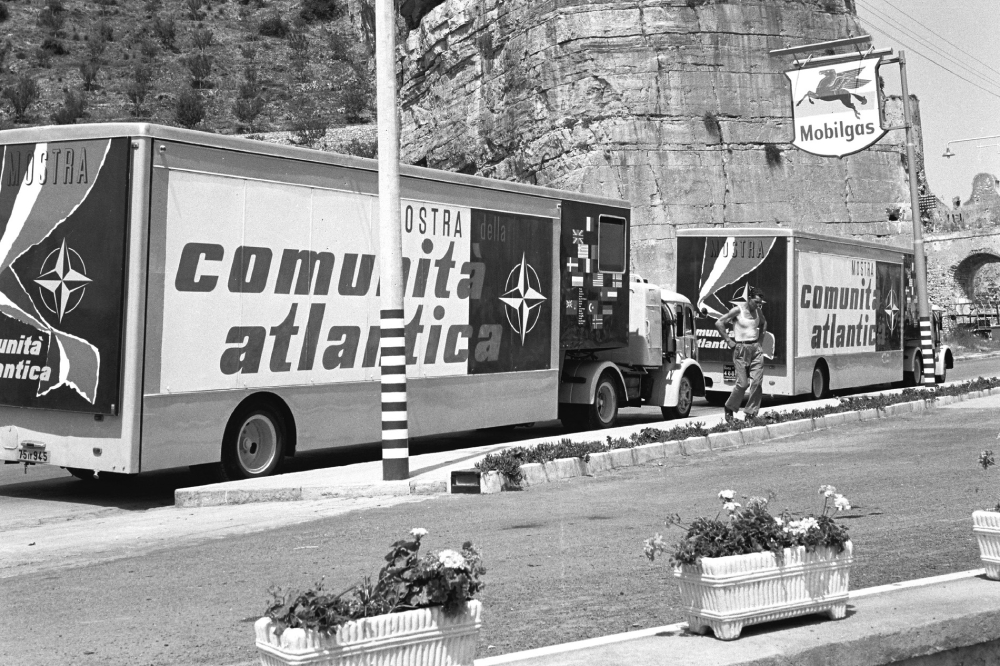
NATO's travelling exhibition promoting "the Atlantic community" somewhere in Italy, 1952.
Musically it's not up to much. While Santini and Vicinelli still make a fine duo - the ranting punk and the hippie bassist - you can't ignore the glaring absence of the late Dario Parisini's venomous guitar attack. There's a gaping hole in the sound that was once filled with pure spite, Parisini's rapid fire riffing and detuned detonations seemingly bringing out his bandmates' most animalistic energies.
While Santini has been the collective's main voice since the Blood days (remember them? The no-mark teenaged punk band from Bentivoglio?), Parisini was always the philosophical and rhetorical core of the band, the demonic, wonky-toothed imp whispering depraved edicts into Santini's ear as Disciplinatha's propaganda minister snarled from the pulpit.
It's never a good sign when the press release is far more edgy and caustic than the music itself. The whole thing is as about as incisive as a musical "comedy" number by Mitch Benn or a B-list SNL cast member. And that's not an insult I hand out willy-nilly. It goes to show that you can carefully craft the most attention-grabbing image and rhetoric you like, but if you don't have the tunes to back it up then you're just another angry middle aged man venting his spleen on social media.
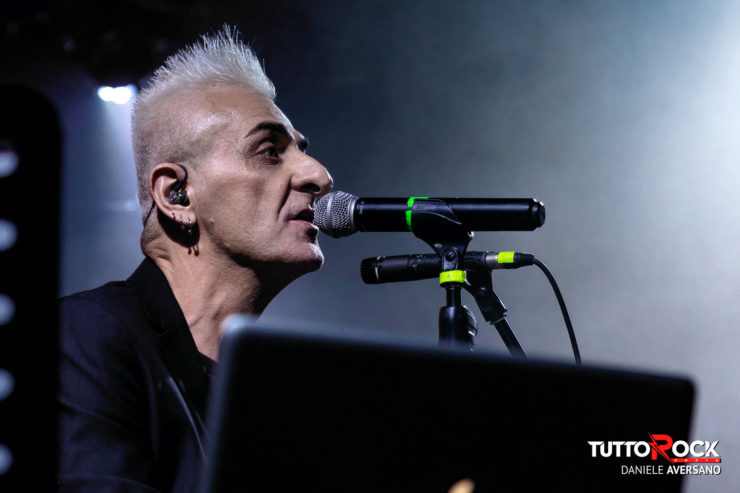
Cristiano Santini, the only frontman in rock n roll whose head is shaped like the flag of Nepal.
"State of maximum alert, state of martial law", Santini intones over a lumbering mid-paced beat, sounding for all the world like he's announcing "Next stop: Parma. Please do not leave items unattended." on the commuter service to Milan.
There's an interesting (but not exactly groundbreaking) dubby take on Lucy In The Sky With Diamonds, which serves as an unfortunate reminder of what makes a worthwhile Disciplinatha cover and what doesn't. That is to say, their best covers achieve that Laibachian stunt of making the listener pause and think about double, triple layers of meaning, about the wry irony in the choice of song.
This passable cover does nothing except demonstrate that for all their wounded Italian pride and furious denunciation of Anglo-American cultural domination, D-I-S are just another bunch of old farts who wear blue jeans and listen to the Beatles, just like their newly-liberated parents before them. File alongside the pointless cover of Joy Division's "New Dawn Fades" on Primigenia.
The one effort I can't scorn them for is the closing title track ("onDario"), paying tribute to their deceased guitarist with sombre orchestration and the same lumbering bass and beats interplay that underpins the rest of the tracks but suits the mood here at least. The album movingly draws to a close with the most moving, heartfelt words Santini has uttered in decades:
"I'm not saying that now you would know what to do
Not even God can do anything now
But all this is here to stay
You, on the other hand, how much I miss you, my friend..."
I must admit I got a little choked up at this eulogy. But then I remembered I'd just paid these fuckers ten Euro for an album with as much musical bite as REM, and the words "me ne frego" sprang to mind.
The guilty have no pride
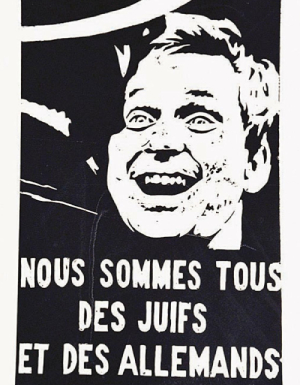
While the artists fka Disciplinatha continue raging against Atlanticism and Pro-Europeanism, a rather more famous (and 100% undeniably, categorically Nazi-sympathising) artist in the "dark"/industrial music landscape seems to have gone the other way.
One Douglas Pearce, of Woking, Surrey, has taken to draping Death in June's stage set with the flags of the EU and Ukraine, while cheerfully walzing across the international picket line to perform in Israel.
That the Israeli government allows a man with openly neo-Nazi views into this supposed safe haven for Jewish people speaks volumes about its true values.
That this same brownshirt can so comfortably align himself with the liberal democratic values every free citizen west of the Donbas purportedly shares suggests he's well aware of how few repercussions there are for sporting a Totenkopf on the frontlines of the war for Europe's soul.
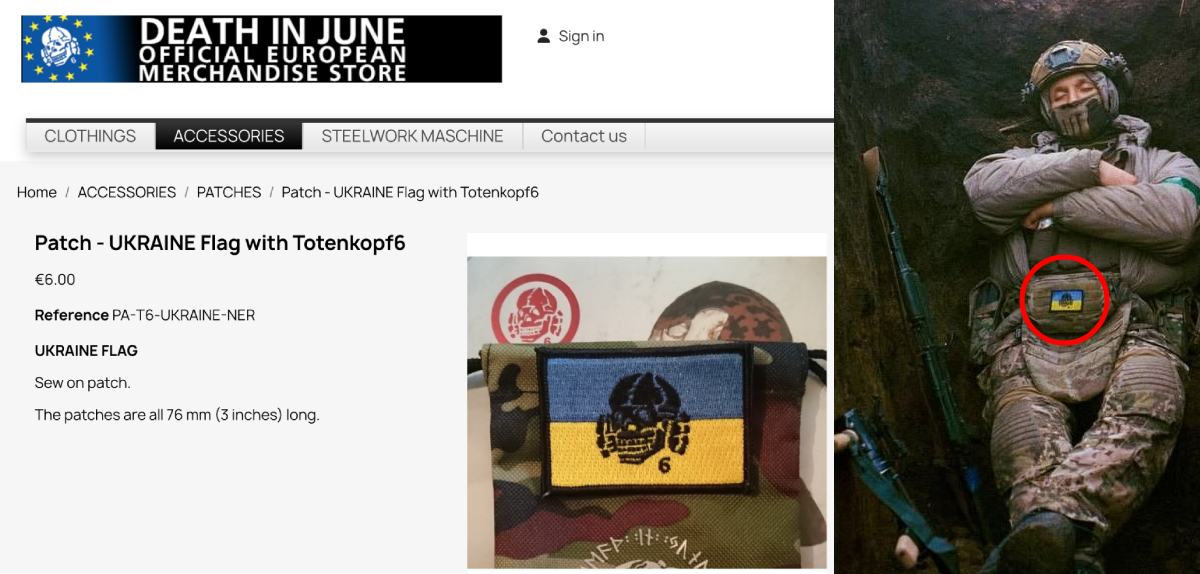
"It's a Hindu peace symbol, honest!"
Pearce's old bandmate Tony Wakeford, for what it's worth, has gone fully Lib Dem, having previously been a Trotskyite and a full-blown you-know-what.
To go back to an earlier question that plagued observers of the Disciplinatha days: are Dish-Is-Nein fascists? No. They are undoubtedly cranks, isolationists and deeply resentful of the forces that liberated their country at the end of the Second World War, but you won't be seeing them marching for Meloni any time soon. She probably can't even name three of their albums.
At the risk of sounding petty, it is perhaps worth noting here that the golden boy of leftist Italian alternativa, CCCP's Giovanni Lindo Ferretti, has become increasingly vocal in his support for the Italian right, endorsing the Lega Nord and, you guessed it, Giorgia bloody Meloni.
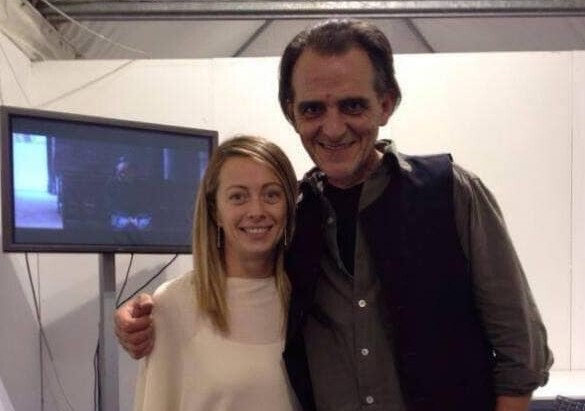
Certain people of severely limited intellect and political literacy might, at this point, suggest that Ferretti's flip from far left to right wing is the logical conclusion of a phenomenon known as "horseshoe theory", but until enough horseshoes are dropped on my head as to make me powerless over my own bladder, I will not be giving this absurd, infantile school of "thought" a single inch of breathing space.
Nobody's political outlook flips from one extreme to the other overnight. Consider how much centre ground they have to traverse to get there, and ask yourself why that centre ground is so ineffective a barrier to extreme rightward progression.
Kings of controversy
A final word on art, controversy and the artist's willingness (or lack of) to take it as well as dish it out.
As I write this, an Irish artist is under fire for expressing views that clash with the status quo. While it would be disingenuous to compare their broadly correct political thrust to Disciplinatha's murkier leanings, at the core of this debacle we find the same old story of an artist biting off a little more controversy than they can handle, ending up having to meekly tone it down and apologise to performatively outraged critics - who, as everyone knows full well, have ulterior political motives for demanding compromise from the artist in question.
In a truly liberal, pluralistic democracy, however, we must let everyone have their say, whether or not you agree with Jim Corr's views - or Disciplinatha's, for that matter.


In memory of Dario Parisini (1966-2022) and Franco Battiato (1945-2021). Alla riscossa, stupidi!